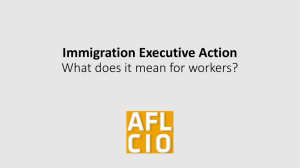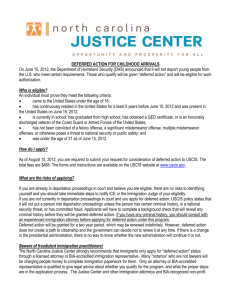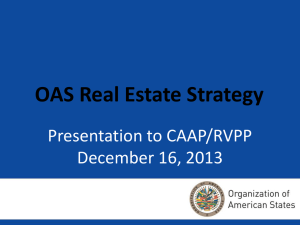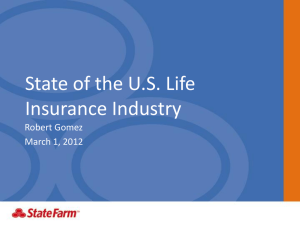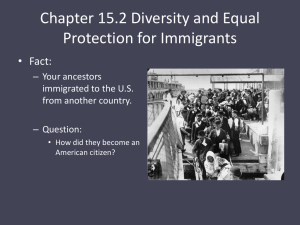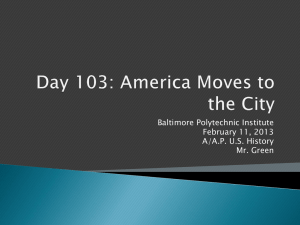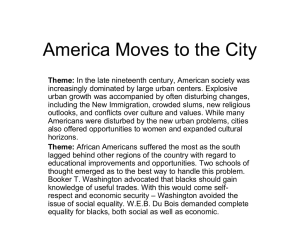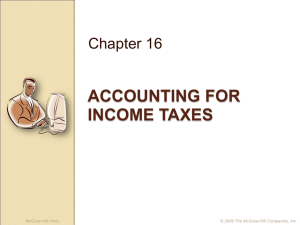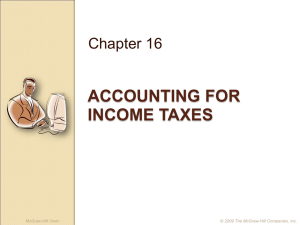Work Without Fear Legal Briefing: Advancing Workers - AFL-CIO
advertisement
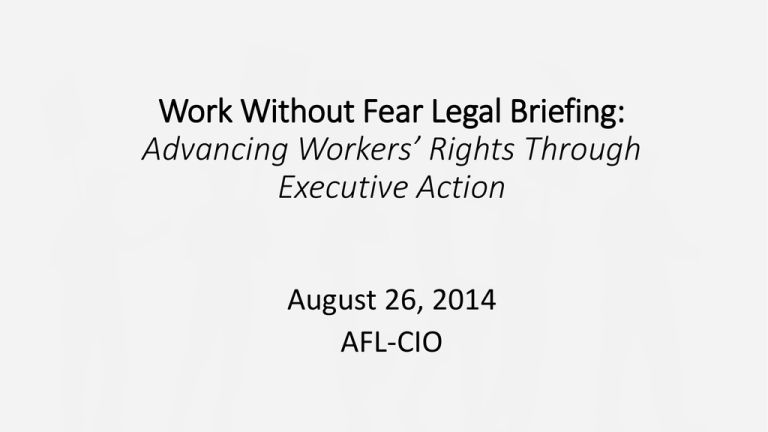
Work Without Fear Legal Briefing: Advancing Workers’ Rights Through Executive Action August 26, 2014 AFL-CIO Background • 2009: Immigration for Shared Prosperity: Labor Movement’s Principles for Immigration Reform • 2012-June 2013: Senate Bill 744 • April 2013-Present: AFL-CIO calls on White House to take administrative action to address immigration while Congress continues to consider legislation Priority: Broad affirmative relief with work authorization • 8 million of the 11 million undocumented individuals in the U.S. are employed. So, broad relief will have a strong positive effect on worker rights. Affirmative Relief • Deferred action: a form of administrative relief that allows individuals who are low priorities for removal to come forward and seek temporary protection and work authorization. • Deferred action does not provide a path to a green card or to citizenship. • Deferred Action for Childhood Arrivals (DACA) offers a model. DACA allows DREAMers to work without fear by providing two-years of deferred action, which is renewable. Broad affirmative relief • Total undocumented community: 11 million • Would benefit from Senate Bill 744: 8 million Worker protections needed in a broad affirmative relief program: (1) No employment requirements for eligibility. (2) Protections against firings, demotions, or other adverse job actions against newly work-authorized individuals. (3) Encourage employers to cooperate in providing documents needed by employees to prove presence. Priority: Enforcement-related reforms • Reassert the primary role of the federal government in determining and implementing immigration enforcement priorities by ending programs that delegate these responsibilities to state and local law enforcement, e.g., Secure Communities and 287(g) agreements. • Ensure that enforcement policies respect due process and do not unfairly criminalize the immigrant community by ending Operation Streamline and the practice of expedited removals. Priority: Specific worker-focused reforms need in addition to broad affirmative relief (1) Deferred action for individuals engaged in protected activity. (2) Revised internal agency guidance on noninterference in labor disputes. (3) Protect worker rights during I-9 audits. (4) Take steps to strengthen the U visa program. Deferred action for individuals engaged in protected activity: • Current policy: Immigration and Customs Enforcement (ICE) will use prosecutorial discretion to grant deferred action to individuals engaged in protected activities related to civil rights and union organizing. • Problem: No standard application process. Deferred action is only granted after individual has been arrested, chilling organizing efforts. • Solution: New process so that individuals engaged in protected activity can affirmatively apply for deferred action and work authorization. Revised internal agency guidance on noninterference in labor disputes: • Current policy: Legacy INS Operating Instruction 287.3a is supposed to prevent ICE interference in labor disputes. • Problem: Policy is badly out of date and many officers in field not aware that it is still agency policy. • Solution: Update the policy to take account of ICE’s current worksite enforcement practices, especially I-9 audits, and publicize existence of new policy. Protect worker rights during I-9 audits: • Current policy: ICE does not generally share information about I-9 audits with unions that represent workers at the audited employer. • Problem: Unions have a duty to represent their members and employers are required by the National Labor Relations Act to bargain with the union over the conduct of any reverification process that flows from an ICE audit. • Solution: ICE should create a protocol for timely sharing information about I-9 audits with unions and other worker representatives. Take steps to strengthen the U visa program: • Current policy: U visa regulations permit federal and state agencies to certify U visa applications where a worker is a victim of a qualifying workplace crime. • Problem: US Customs and Immigration Services, which issues the U visa, has rejected or delayed some applications certified by these agencies because it appears to be applying a higher standard for “substantial physical or mental abuse” in workplace crime cases than in other cases. • Solution: Department of Homeland Security should direct USCIS on the correct application of this standard in cases involving workplace crimes. Priority: Enable access to citizenship: • Current policy: More than 9 million Legal Permanent Residents (LPRs) are currently eligible to apply for citizenship and approximately 1 million more become eligible each year. In 2013, only 500,000 naturalized. • Problem: In recent years, the fee to apply for citizenship has jumped to $680. Many eligible LPRs do not apply for citizenship because of high fees and lack of information about the process and benefits. • Solution: Lower application fees to encourage eligible LPRs to apply for citizenship and active promotion of naturalization so that more community members will have a voice. For additional questions, contact: • Shannon Lederer, Director of Immigration Policy, AFL-CIO • slederer@aflcio.org, (202) 637-5308 • Matt Ginsburg, Associate General Counsel, AFL-CIO • mginsburg@aflcio.org, (202) 637-5397
